Past Spotlights
2024
Undergraduate Spotlights
2023
Graduate Mentor Spotlights
Undergraduate Spotlights
2022
Graduate Mentor Spotlights
Undergraduate Spotlights
2021
Faculty-Undergraduate Student Partnership Spotlights
- Brandeis Educational Justice Initiative
- CLARC — Ancient History and New Technologies Come Together in CLARC’s New Research Agenda
Undergraduate Spotlights
2020
Undergraduate Spotlights and Partnerships
- Hannah BenDavid '22
- Jason Frank '22
- Chengrui (Chelsea) Wu '22
- 2020 Faculty-Undergraduate Student Partnerships
A Conversation with Graduate Student, Mentor and Research Associate Zora Haque
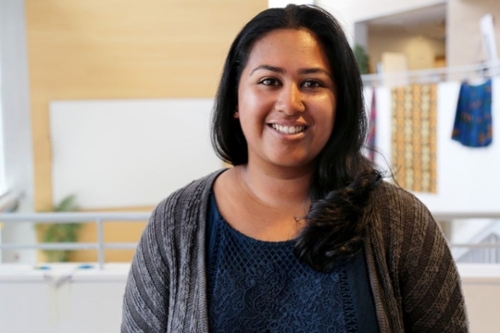 Zora Haque, pronounced ZO-ruh HAWK, she/her/hers
Zora Haque, pronounced ZO-ruh HAWK, she/her/hers
In this edition of the URCC Graduate Spotlight, we highlight the research and mentoring contributions of Zora Haque, a research associate at the Heller School for Social Policy and Management who is also a graduate student in the Master of Public Policy Program.
Zora was an integral team member and undergraduate mentor for a project led by Derron Wallace, assistant professor of education and sociology. This project involved an analysis of survey responses from over 17,000 Boston public school families as the district sought to understand their experiences with remote learning [during spring 2020] and opinions on school reopening options [for the fall]. Examination of the data uncovered racial inequalities in access to remote learning. The research team presented their results to the Boston Public Schools (BPS) in fall 2020.
Zora shared her experiences in a Zoom conversation with Margaret Lynch, director of Undergraduate-Faculty Research Partnerships in the Undergraduate Research and Creative Collaborations Office. This interview has been condensed, reordered and edited for length and clarity. Thanks to Natasha Chairyarat ’22, URCC undergraduate asssistant, for her help with the interview transcription process.
URCC: Did you participate in research as an undergraduate?
Zora: Getting to have that experience was a [major factor in my college search] … so [I chose] to go to Clark [University, in Worcester, Massachusetts], for its reputation as a strong research-based college with a [robust] psychology program, which I majored in. I got there and spent the first two years taking research methods classes and really getting to learn how the process works, what tools you need, the skills that help you conduct ethical and efficient research and how to problem-solve. For the second half of my degree … I was able to conduct my own independent research. I spent two years completing a thesis on academic achievement motivation, [examining] how public school students formulate this on their own terms over time. But I think more importantly, [during] my junior and senior years … [I took] classes where I assisted grad students and professors in their own research. And I would say that those were probably my more critical experiences … in college because if I didn't learn the skills that these [experienced] people taught me, I don't think that I would have been able to complete my own research as successfully as I did. Their style of mentoring me … catered … to my own personal learning style while still encouraging my growth, so I could really retain the information and know how to actually apply that knowledge to my own [work].
URCC: What sparked your interest in what you're working on now?
Zora: I've been really engaged in researching the American public school system for quite some time now ... which [I get to do in various ways in my] current research role at the Heller School … [and other related positions at Brandeis]. My own upbringing, hometown culture and other parts of my identity made the system really intriguing to me, and made me question a lot about its structure. There were definite and clear differences in school culture [considering my high school and those that my friends and family attended], which for myself absolutely impacted my ways of navigating my own education and defining what success meant to me. It made me consider how strongly [all of this intersected and] influenced me, and wonder if and how similarities and differences may have materialized among and between my classmates. [I wanted to know] what the root cause[s] of that might be.
I knew early on that I wanted to teach in my future career, and I wanted to … represent what I really wish I had in my high school experience [as an] educator of color, [especially] as a woman. Now in my master's program, I concentrate in child youth and family policy to dig more deeply into my interest in education. And because of that, I ended up taking a class with Professor Wallace [in spring 2020]. The professional relationship that we've continued to foster has led to my continued involvement in both these types of evaluations, [as well as serving in] mentorship roles to undergraduates.
URCC: What part of the [BPS] project did you work on? What questions were you asking and what were approaches to answer those questions?
Zora: We specifically chose to focus on family data. [BPS] was looking to receive some policy and programmatic recommendations for how to move forward with school reopening plans … so through our work [in assessing parent surveys specifically], we were able to determine feasible and evidence-based solutions to the district, focusing specifically on approaches that may assist in mitigating inequalities in current and future student’s learning and their family’s engagement. We needed such a large team to make sure we [met] the district demands for the evaluation to be delivered in time for the new academic year. Because the nature of the data was from open ended questions, it was all qualitative information. We had a lot of … data cleaning and coding [to do] … to … [identify parent] … concerns and needs for both themselves and their children [that they stated would] … best help them in an either fully remote or hybrid learning model.
URCC: Tell me a little bit more about the data cleaning and coding. What kind of skills did you need to accomplish that in terms of software?
Zora: [The] Atlas Ti [program was used for our research].
URCC: How did you learn to use Atlas Ti?
Zora: I learned it at a previous job … [where] a former boss of mine taught me how to navigate the system and how to apply codes, [and] how to ... [troubleshoot].
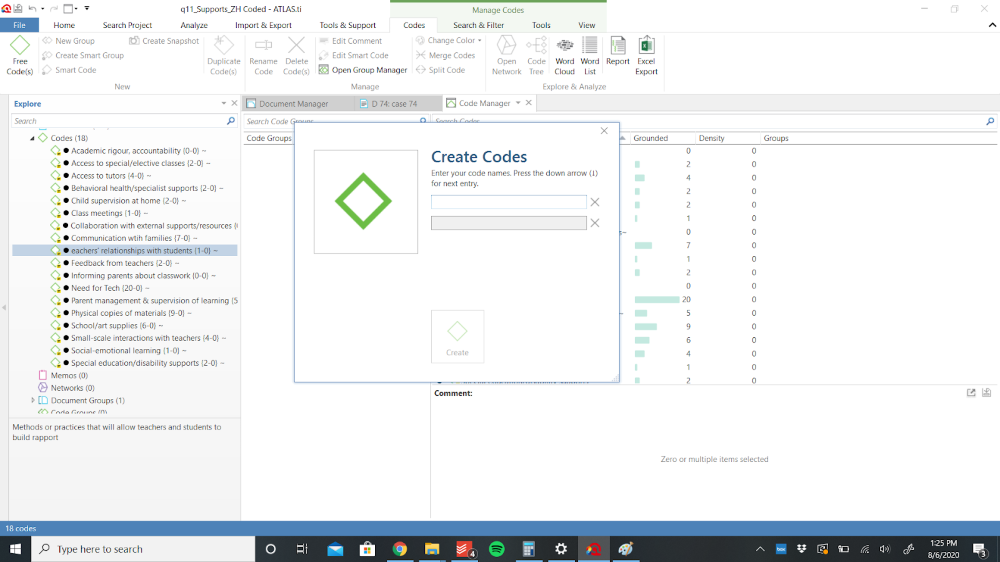 Dashboard in Atlas Ti, a program used to code and analyze qualitative interviews
Dashboard in Atlas Ti, a program used to code and analyze qualitative interviews
URCC: How did the undergraduates learn Atlas Ti?
Zora: [Myself and my coworkers within the senior team] … [including] a current doctoral student at Brandeis and a recent graduate from the Heller School Social Policy [PhD] Program … oversaw and [taught the undergraduate team how] to use Atlas Ti. [This included] going through individual examples [as a group], and then having people go off on their own and code [their own portion of the data set, before we reconvened] as a team to review things together. There was a lot of teamwork needed for this project in [general, but particularly in] mentoring [the] undergrad [team] … so that we were as efficient and accurate as possible when it came to this important analysis.
URCC: Given your positive experiences as an undergraduate researcher, how did you draw on those experiences in your relationships with undergrads this past summer in terms of your mentoring style and approach?
Zora: The mentors that I had as an undergrad … both taught me new skills and also helped me refine them more within very targeted research contexts. Having very personal connections and relationships [with them too] helped me see myself as someone who really belonged in this space, whether that meant as a researcher or as a leader. As I grew more confident while improving my skills, I increasingly gained confidence in my own abilities to pass that knowledge on. [My experiences as an undergrad] involving working in small research teams alongside my classmates also showed me … [that] every single individual matter[s],and [this] absolutely translates into how I operate as a mentor now. No team can succeed without equitable opportunity and attention, and I've carried that with me since my research experiences in college.
I think that if I didn't have the mentors I had throughout college … [I would have had a harder time believing] that I belonged in this space or that I would have been able to succeed in [my pursuit of] the career that I wanted. And I think particularly as a young person of color, that was even more important. … [Since] … our team for the [BPS] project [was] primarily [comprised of] students and academics of color … it was very rewarding to see the undergrads emerging from this [experience] as even more skilled researchers by the end of it. I think that [this] was one of the best parts of this experience for me because … I saw [their growth mirroring my own] …when I was in [their position].
URCC: Do you have any actionable advice you can give for aspiring early career mentors, for example, people in the post-bac or grad student stage?
Zora: In terms of yourself, if you want to be a good mentor, you have to know the material and skills required for a job inside out. So as you're progressing in your own academic and early stages of your career, really take everything in and perfect your expertise to your best ability. You, of course, can't learn everything, but want to be as confident as possible before sharing knowledge with others who have yet to get more, if any, exposure to this field. [Also] … remembering that the relationship between you and your mentees goes both ways and … that mutual respect is an absolute necessity. Remembering that you were once in their place, too … reminds [us] of what it felt like … [to be] overwhelmed, confused and unaware of everything that’s needed … in order to complete the task at hand and continue to move forward. [So,] I would say, putting yourself in your mentees' shoes is … often the best way to ensure that you're giving them the advice and help that they really need.
URCC Undergraduate Spotlights
Annabelle Fitch '23
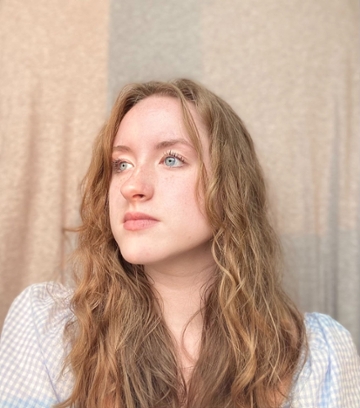
URCC: Can you tell us a little about your research project?
Annabelle: I am a psychology and neuroscience major, and so a lot of my research and my research interests really center on the brain. One of my primary research interests is looking into different trauma and anxiety disorders. When I entered the Howard lab [James Howard, assistant professor of psychology], I saw that there was a lot of equipment that would enable us to do behavioral studies with physiology measurements, and it also is a really unique lab in that they have a lot of breathing measuring equipment […] Seeing all this equipment [and] knowing my own interests, I looked into the research and found that there were certain breathing patterns that were associated with more anxiety and panic and that other nasal breathing patterns, conversely, were associated with slowing these hippocampal and amygdala responses. I’m looking not at fear or trauma acquisition, but at the extinction of the behavioral and emotional responses to trauma in relation to these breathing patterns.
URCC: What sparked your interest in this field, and did you have any projects prior to this one?
Annabelle: I don't really think I had a ton of background coming into this […] I was a midyear student [when] the pandemic started, so I was never able to do any research until I entered the Howard lab in late spring of my sophomore year. But my dad is a school counseling psychologist and my mother works in a psychiatric hospital as a psych nurse, so I’d always had all these materials around different books regarding psychology and neuroscience that I would just read and be so fascinated [...] in this sort of anxiety and trauma realm of psychology and neuroscience.
URCC: From whom did you receive mentoring and guidance?
Annabelle: My psychology advisor is Dr. Margie Lachman and my research advisor is Dr. James Howard.
URCC: So, you mentioned that you didn't have much prior experience with research. How did you get skills or training?
Annabelle: A lot of my research hinges on programming through MATLAB to set up the experiment and have all of the physiological variables be recorded so they can be analyzed. Coming into it, I really had no experience, but I developed some proficiency in MATLAB through two things. One, I did a workshop with the library, actually, which was really helpful. Two, Dr. Howard pretty much just walked me through all the basics [and] let me try out experiments with little sections of code […] We had to write an IRB application, but that was mostly writing and defending that this was an ethical experiment. I feel like I really developed those skills through Brandeis’s own psychology and neuroscience classes, so that's what I had going into it.
URCC: What type of funding did you have for the project?
Annabelle: I did get two fellowships which I’m incredibly grateful for. I had the Provost’s Summer Undergraduate Research Fellowship last summer from sophomore to junior year and currently my work is funded by the Schiff Fellowship.
URCC: Were there any obstacles or challenges you faced while starting your project and how did you overcome them?
Annabelle: I would say my main challenge or obstacle was my lack of proficiency in MATLAB because so much of psychology experiments happen on the computer now, and rely on coding. I got help through the Library, and I got help through lab members and Dr. Howard, so it's been alright since then.
URCC: Did you experience any unexpected benefit from engaging in this project, or the research you're doing?
Annabelle: Having a lot of support from my PI or other members of the lab. If I’m struggling with literally anything, I know that I can go to them and they're just absolutely wonderful. I would say that doing my study has made me into a more analytical and scientific-thinking person. I’m able to think more critically about information presented to me and both critique what prior authors have done in terms of other literature and see how I could build upon it in this new way that I learned during my literature review.
URCC: Do you have any advice for other students who want to participate in similar research?
Annabelle: Mostly just keep reaching out to people […] communicate with professors, be persistent. I’d say definitely look into fellowships; this has been one of my most enriching student experiences and have fun with it.
Jason Walter '23
 URCC: Can you tell me about the questions you're exploring for your research project?
URCC: Can you tell me about the questions you're exploring for your research project?
Jason: My research for the summer was with Professor Kerry Chase in the Politics Department and mainly about the Kosovo war in 1999 where NATO launched an intervention to stop genocide outside of the UN […] and this is notable because […] NATO had previously acted within the UN. In this case, they chose to go outside [and] beyond. How did that happen? What diplomacy made it possible? And what was essentially the role of the UN in this? How did they view the UN? I always struggle to concisely summarize it. Essentially, how was the intervention successful without the UN and how do they reach a diplomatic solution that was really accepted while still remaining outside the UN?
URCC: What sparked your interest in this particular research area and did you have any prior research projects?
Jason: This research project stemmed from a term paper that I wrote for Professor Chase’s class on the same subject. In the fall of 2020, I took the class called The United Nations and the United States with Professor Chase. The [assignment for the] term paper was to write about an instance of UN action that the U.S was involved in or something close to that; but the point is to design your own research question about this case and do your own research to support that, and so I wrote mine about the Kosovo war […] I wrote a paper arguing that NATO had sort of legitimated directions in the eyes of the world without use of the UN. Then Professor Chase later came back to me after I wrote that paper and said this connects to a lot of current publications in political science, so we can do some research on this, if you like. So that's what sparked my interest in this, it stemmed from a paper I wrote in his class.
And then did I engage in any research projects before this? Yes, in the summer of 2020 actually through fall of 2020 and the spring of 2021, I was working on a project with Professor Kogan who used to be a professor at the Heller School about the Cuban missile crisis. I had been funded last summer with the Louis Brandeis Legacy Fund for Social Justice to work on this and was a research assistant. The project was about JFK and his negotiating style during the Cuban missile crisis.
My current project [is] about Kosovo; I’m a co-author with Professor Chase on a paper that we're doing research on together. With this first project on the Cuban missile crisis with Dr. Kogan, I was a research assistant, and it was an entry experience into the world of academic research.
URCC: How did you find out about these opportunities? Was it mainly through your professors?
Jason: I think about this all the time; that I’m really, really lucky that both times it was the professor who came to me and said either, "Would you like to work for me on this," or "Would you like to work with me on this?"The second time, it was because I had enrolled in Professor Chase’s class. The first time, it was a little bit more complicated. I’d seen a flyer for a lecture given by Dr. Kogan at the Heller School; I went to the lecture and I really liked it. I asked him if he was teaching classes, and the next semester I enrolled in a that he was teaching […] After that class, he asked me to work for him.
URCC: What research skills did you need to get started, and did you need training?
Jason: I honestly don't think it was anything that training relevant. For my first project […] it was very much learning on the job — working with primary source documents and finding primary source documents — and I was able to develop those skills slowly through working on the Cuban missile crisis project. When I was in Professor Chase’s class,I knew sort of how to work with primary source documents […] So it turned from learning on the job on the first one to “I have that skill I’m going to apply to something else for my second user experience.”
URCC: Is there anyone who gave you mentoring, guidance or inspiration?
Jason: Yeah, definitely Professor Chase […] He was really helpful to explain the new concepts and figure out how we can apply them to the case and really widen the possibilities. In addition to him, Dr. Kogan from my Cuban missile crisis project. His guidance — when I was working for him, and showing me where to look for certain things — he set a really high standard of how concise you want me to be, and so I really had to get myself together and make sure that I was producing quality work, and that has really benefited me and my work since then [...] A lot of times I think about how working for him on that project really prepared me for my project on Kosovo. Finally, I’d say Meredith Monaghan [in Academic Services]; she gave me a ton of help and advice.
URCC: What type of funding did you receive for your project?
Jason: This past summer [2021] I was funded by the Provost’s Undergraduate Research Fund.
URCC: What were some of the challenges or obstacles you faced during the research process and how did you overcome them?
Jason: I think the sort of biggest challenge getting into research for me was time management. This work was something that's very open-ended; like, I need to get through these many documents. In addition to that open-endedness, everything was online, so Professor Chase and I were both working at home. The nature of the work we're doing is unstructured. It’s really like we weren't commuting anywhere to try to get these resources, so there wasn't anything to build a schedule around, initially. But you don't want to get burnt out during this, so for both my research experiences I really started off summer with setting limits like, “Alright, I’m going to work from 10 a.m. to 5 p.m., then once 5 p.m. hits, I’m done. I don't think about it until tomorrow morning.” And that worked really well with making sure that I avoided being burnt out, and I had an opportunity to do research, and also that I had enough time to do other things and enjoy my summer.
URCC: Did you experience any unexpected benefit from engaging in your project, and are you doing research now?
Jason: Yes, and sort of. So, for the first part with unexpected benefits two main things: one relates to my senior thesis (I’m a junior right now). Next year I’m going to be writing a thesis for the Politics Department. After doing all this research on Kosovo, I want to at least have my thesis relate to it.
And then it's also helped me figure out what I want to do after college. After my first research experience, I found that I want to focus on international relations instead of American politics. After the second one, I found out that within international relations, I want to focus on conflict resolution negotiation, specifically in situations related to political violence. This doesn't mean, “I go to this program for grad school and I go to this job." But I do sort of know, in a more focused way, what to look for when I’m looking at grad schools. I'm not currently working on the research with Professor Chase right now. I’m studying abroad in London for this year, but we are going to continue work this summer and work on writing up a draft paper.
URCC: What advice do you have for students who also want to participate in similar research?
Jason: A few things. If you have a topic you're interested in, find a professor you like and bring it up with them because, even if they can't supervisor research, they will be able to help you narrow down your research interests into a more defined ask, It's like the difference between saying, “I’m interested in international crisis negotiations” and then saying, “I’m interested in the negotiations surrounding micro civil war and how the UN was or was not involved in tha." Once you've got that down, it's then much easier to find a mentor and find funding, because you have a much more focused topic that will stand out a lot more. I’d like to emphasize how much all this is a bit specific to like politics and history students.
I am really, really lucky that both of my research opportunities came about without much searching on my part. But what I can say is that you should really look for and take every single opportunity that arises. So I mentioned that I only met Dr. Kogan because I saw a flyer on Facebook for a lecture he was giving, and I went! That led to me taking his class, and that led to me working for him, and I often think about what would have happened if I never went to that lecture that day. So if you see something that interests you, go for it; talk to the Professor, see what else they offer and you never know what that might lead to.
Undergraduate Researcher Spotlight: Vicente Cayuela Aliaga '22
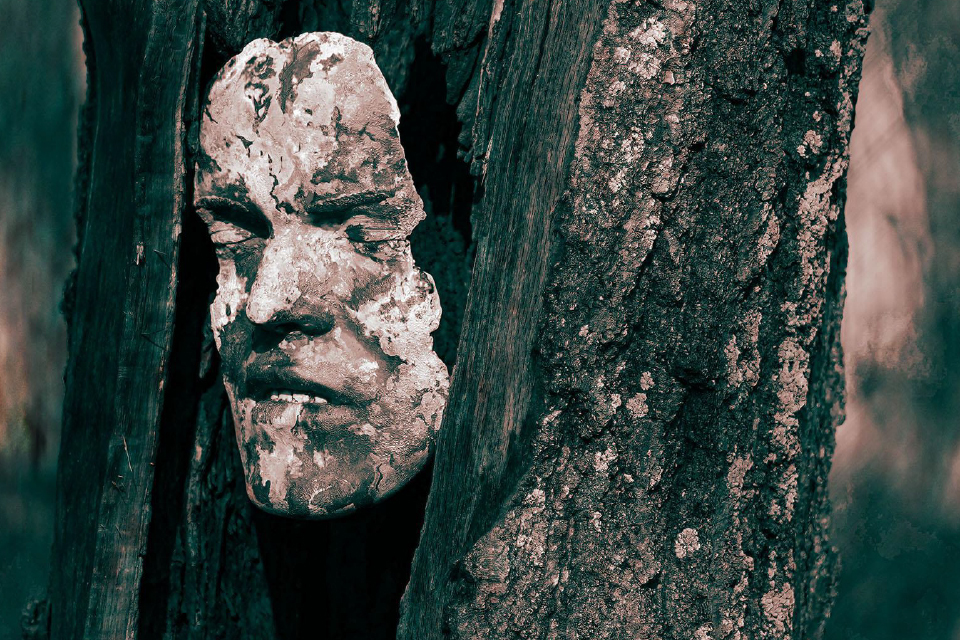
Majors: Studio Arts: Sculpture and Digital Media Focus
Minors: Architectural Studies, Film, TV, and Interactive Media
Faculty Project Mentors: Catherine Della Lucia, Joe Wardwell
Current Focus: Studio Honors Thesis
Brandeis senior and artist Vicente Cayuela Aliaga is one of eight undergraduate recipients of a Fall 2021 Fisher Explorer Grant. He was also awarded a 2021 Remis Summer Study Grant to support his projects and studies in Fine Arts for his novel explorations of alternative photography, among them creating constructed photography sets and paper sculptures with cyanotype prints, as well as the Steven M. Bunson ’82 Internship Fund in the Arts WOW from the Hyatt Career Center. His sculptural and photographic projects are being exhibited in two upcoming group exhibitions at the Griffin Museum of Photography.
Vicente’s creative contributions extend beyond Brandeis. A successful internship at the Griffin Museum of Photography prepared him to accept his current position as Lead Content Producer for Video and Social Media. This previous museum experience also allowed him to become the current Lynn Warner Curatorial Intern at the Rose Art Museum.
Vicente recently had a conversation with Janavi Swamy, ’23, URCC Undergraduate Assistant. The conversation has been edited for clarity and length.
Can you tell me about your creative project and what questions you're exploring?
I am exploring the intersections of photography, object-making and readymades. By merging these elements together, I try to expand the ways in which photographs can be constructed as well as the ways in which they can exist in space. Objects not only carry sociocultural meaning, but they also play a role in the construction of our personal and collective identity. Photography is a great medium because it is a means for both societal and self-representation. My Studio Art Thesis started as a reaction to our alienation from nature. However, I have recently started feeling more comfortable exploring my own juvenile experiences through my photographic practice… By incorporating objects that have both autobiographical and larger cultural significance, I create complex narrative compositions that are both comical and melancholic. I am inspired by romanticized ideas of teenage angst, nostalgia and my own coming-of-age. These photographs address seldom-talked issues about adolescence, including drug addiction, domestic abuse, loss, trauma, lack of guidance, sexual alienation, and social isolation.
What in particular sparked your interest in photography and these projects?
I'm interested in merging digital and physical mediums because digital media has way more potential for mass cultural engagement than other artistic practices. At the same time, it is paramount for me to incorporate material elements into my photographic practice as a way to honor the physicality of manual labor. I come from a family of wood and textile workers. I lived in a carpentry workshop most of my childhood, so I developed an affinity for manual work and aesthetics from a very early age. I think this is my own way to keep that connection alive.
I discovered alternative photographic processes at the Griffin Museum. I like alternative photography because it’s very physical and process based; you're not just pressing a shutter. During the summer of my internship, I got a Remis Grant from the Fine Arts Department to explore the cyanotype process. Cyanotypes have a bad rep because it's a very accessible and straightforward alternative process. By making sculptures out of the prints I want to show that it's not the medium that's limiting; which is what I have been exploring in addition to my constructed photographic sets. One of my sculptures is being exhibited at the Winter Solstice exhibition at the Griffin Museum in December.
This fellowship that you mentioned, was this the funding for your project?
Last summer (2021), the Remis grant allowed me to start working with cyanotypes. This semester, I got the new Fisher Explorer Grant which I will use to pay for the face mounted acrylic prints of my constructed photographs that will be exhibited in another group exhibition I have in March. In addition to the courses I am taking at Brandeis, I enrolled in the Photography Atelier 35 Course, which is a professional project and portfolio development course that culminates in an exhibition at the Griffin Museum. Last summer, I was also awarded the Stephen M. Bunson ‘82 Internship Fund in the Arts from the Hiatt Career Center’s World of Work (WOW) Fellowships. That program funded my internship at the Griffin Museum before I became their Lead Content Creator.
How did you find out about opportunities for undergraduates and creative scholarships?
I am always looking for opportunities to pursue the things that I am passionate about. I am a very driven person. I’m also very stubborn and also very broke, which is just an awesome combination! I think that when you come from the “Global South,” you know the reality you’ll have to go back if you don't work hard enough. In high school, I was one of the two students in my country that were selected for the EducationUSA Opportunity Funds. This program allowed me to study abroad because it covered all my college application expenses for two years, including visa, plane tickets, and preparation for language tests and the SATs. Thanks to EducationUSA, I was able to receive a Wien International Scholarship at Brandeis, which is a part of a global network of scholars. As an undergraduate, I have received multiple creation grants from Brandeis to work on my creative projects. There are many resources out there and the Internet is a thing. Following the Creative Arts Instagram (@createatbrandeis) is a great way to keep up to date with creative opportunities that are happening on campus.
That's amazing! Have you found any unexpected benefits from your project so far?
I’m probably way more comfortable exploring my own identity and society through my art than I was before… When I began incorporating more of my personal experiences into my photographs, people related to them way more than anything else I had done before. In a certain way, my practice became a tool for communication. It allowed me to connect with people at a different level and that's all I care about, really. The visual arts are probably the most alienating discipline for everyday people, especially to those like me that did not have any access to high culture. In my work, I am addressing the habits of a generation that is not only tired of elitism, we also have a very sarcastic sense of humor to cope with the ridiculous state of the world we live in. I incorporate a lot of camp aesthetics and juvenile paraphernalia as a way to capture this numbness and cynicism. Making art that intentionally reacts to cultural issues is hard because you have to take a stance. For a long time, I was not willing to do that. My creative projects have allowed me to become more loose and at the same time more intentional when tackling social issues that I care about in my work. I like that I am not taking myself too seriously anymore.
What are some of the major challenges you have faced during the process and what steps did you take to overcome them?
The biggest challenge is time and energy. I am taking a full academic load and I work three jobs. At the same time I’m job hunting so I don’t fall off the face of the earth after I graduate. My art practice comprises many stages. I start by folding paper or making prints and then turning them into sculptures, or maybe making plaster casts which I paint and photograph later in nature. I print pictures and collage them to build photographic sets. So, I have to go out to collect objects and arrange them in a way that I can create connections between them. I survey people and my friends about their own youth experiences to see if what I am making is relevant to my generation. After I finally get to take a picture of a set, it’s not done because there is all this post-production work involved.
Another challenge I have had to face is that a lot of people look down at art students because they think arts are not valid professional enterprises. Societal perception around the arts needs to change. The same people that look down at the arts are the ones who benefit from the work of creative people daily and want their logos designed for free. Creatives and artists are everywhere, and they make daily contributions to society.
Did you receive guidance or inspiration from anybody in particular?
Yeah! I’ve received a lot of guidance from a lot of people at Brandeis. Sheida Soleimani has been one of my biggest inspirations at Brandeis, both conceptually and in the production process of my own work. Her work is so aesthetically interesting, but it also tackles identity and political issues in a very cerebral way. She introduced me to constructed photography in “Introduction to Digital Photography,” one of the more impactful classes I’ve taken at Brandeis. Mark Delello at the Sound and Image Media Studios (SIMS) has also been a great mentor. I have worked at SIMS for three years. Thanks to Mark, I have been able to expand my multimedia skills and work for different creative projects in the Brandeis community. The media lab is a great resource for students, because we have access to all sorts of professional software and equipment.
Did you enroll in any creative project for credit and, if so, which courses?
Yes. Over the summer I took the internship class that you need to take as an international student in order to be eligible to work off campus. But this semester, I am doing independent study as part of the academic component of my internship class with lauren woods (she always uses lower case letters.) She was my Video Art professor at Brandeis before the pandemic hit. I am interested in the measures museums are setting in place in order to ensure broader cultural representation, such as deaccessioning works in order to diversify their collections, which is a very controversial topic. Woods was the perfect fit because she specializes in monuments, public memory, and sociocultural practice. She's definitely someone who I look up to for her social engagement and understanding of cultural institutions. I am also enrolled in the Honors class with Studio Art Faculty Joe Wardwell and Catherine Della Lucia.
The images below are (top to bottom):
- Vicente Cayuela Aliaga at the Griffin Museum of Photography
- Untitled Cyanotype Sculpture
- Family Dinner
- Extracurriculars
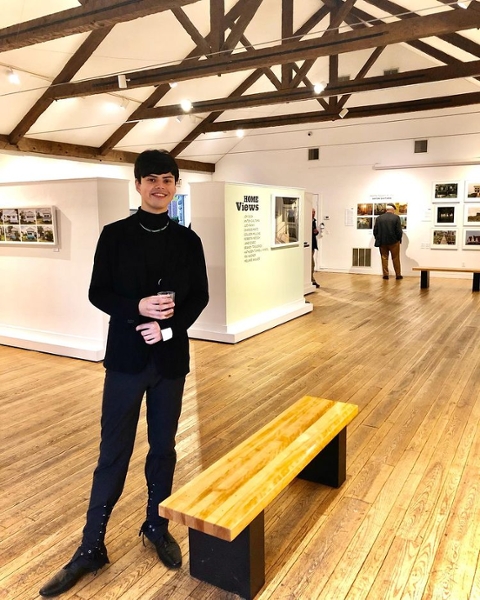
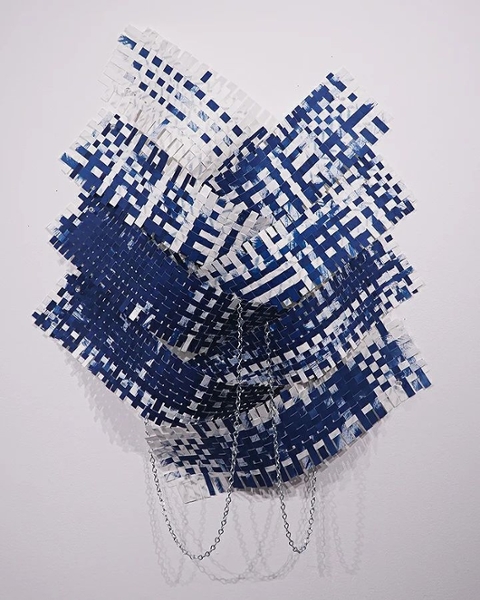
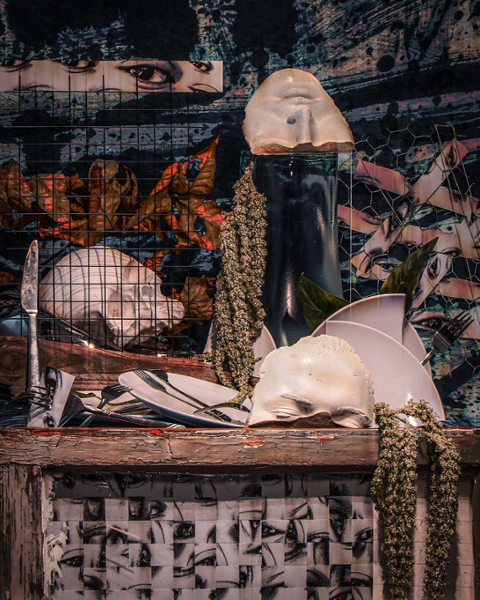
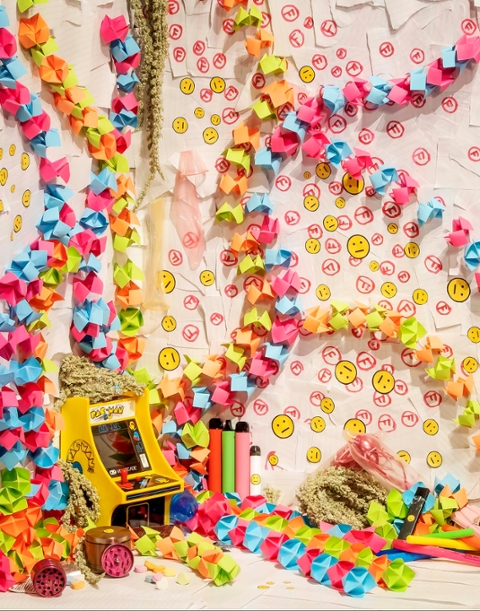
Faculty-Undergraduate Student Partnership Spotlight: Brandeis Educational Justice Initiative
The Brandeis Educational Justice Initiative (BEJI), founded in January 2020, is an emerging program that enables Brandeis students to provide educational opportunities for individuals impacted by the carceral system. BEJI was founded by three full-time faculty members: Rosalind Kabrhel Associate Professor of the Practice in Legal Studies, John Plotz, Professor of English and Barbara Mandel Professor of the Humanities, and David Sherman, Associate Professor of English, to further the University’s core values both within the curriculum and through co-curricular opportunities for students through partnerships with external organizations.
BEJI nurtures the growth of undergraduate and graduate students from their early curiosity about the criminal justice system through participation in hands-on carceral education programs and by supporting their pursuit of innovative research. Some students initially choose to become involved with BEJI through course offerings, among which is the Legal Studies Practicum LGS145a Experiences with Justice, offered every semester. The practicum is a place where students can develop critical understanding about the foundations of the criminal justice system and mass incarceration. Students are provided opportunities to assist in the delivery of BEJI’s educational programs and reflect upon their experience as well as explore their own research areas of interest in a supportive classroom environment. The practicum can also serve as a springboard that encourages further investigation after its completion, fostering a sustained intellectual community. By working directly with individuals within and impacted by the carceral system, students are afforded a unique and valuable perspective in their understanding of mass incarceration, an important social justice issue.
Whether or not they choose to pursue coursework, as students become more involved in and experienced with BEJI programing they have the flexibility to work with more than one program and pursue multiple areas of interest. For example, students can tutor incarcerated students one-on-one through BEJI’s partnership with the Petey Greene Program, assist with a semester long skill development workshop series for recently released individuals through our Partakers Empowerment Program, or assist a graduate student or professor teaching a credit-bearing course to incarcerated individuals. BEJI also hosts a reading group that explores carceral themes. This diverse experience gives students more than one perspective and enables them to explore multiple avenues of research investigating the carceral system. Students who work with BEJI also have the opportunity to pursue leadership roles in BEJI itself. BEJI presents an opportunity for students to be as involved as they like, with participation stretching from one to multiple semesters, including over the summer and winter recesses. The chart below illustrates a student’s possible path through BEJI.
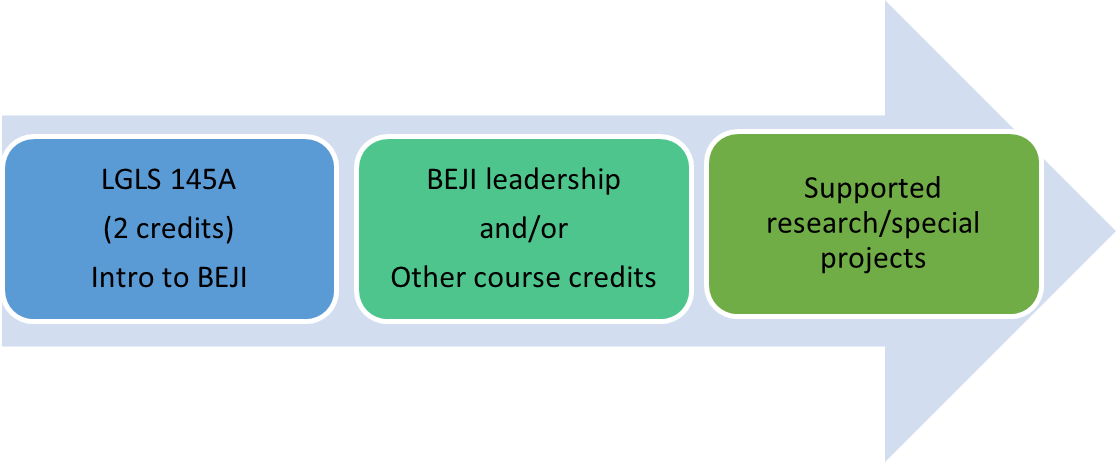
Brandeis senior Caroline O. is an exemplary case of a student whose research interests are supported by BEJI and the Undergraduate Research and Creative Collaborations Office (URCC). Caroline was initially inspired to work with BEJI after taking Professor Rosalind Kabrhel’s course, LGLS 141b Juvenile Justice: from Cradle to Custody as a sophomore. She worked with BEJI as a junior, serving as a teaching assistant to Professor David Sherman when he taught a poetry class to students in custody at the Department of Youth Services. As an English major, this experience offered a unique opportunity to bridge her academic interests. Caroline then decided to examine this experience further by developing her own research project; she was an inaugural recipient of the Jane Kahn ’77 Undergraduate Research Fellowship, which funds student research focused on emerging issues in criminal justice reform. Caroline reflected on these experiences:
I was fortunate enough to be a recipient of the Kahn Fellowship, in which I had the opportunity to delve deeper into the world of juvenile justice, and how creative arts might help those who are involved in the system. While doing this research, I was also teaching poetry with Professor Sherman to those in the juvenile facilities. These incredible experiences helped shed light on how different fields of interest--for me, being English and juvenile justice--can interact with one another to hopefully create change.
Students interested in pursuing a relationship with BEJI can contact any of the three founding faculty members, Rosalind Kabrhel, John Plotz, and David Sherman, as well as Holly Robbins or Rachel Dale, or register for coursework offered by the Legal Studies Program.
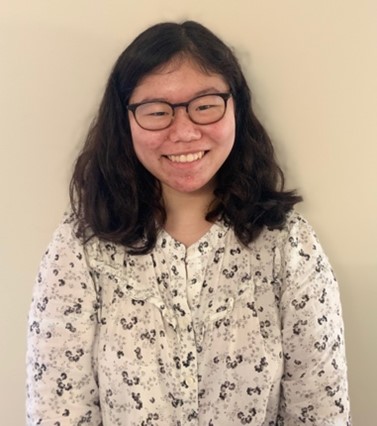 Caroline O, '22
Caroline O, '22
URCC Undergraduate Spotlight: Natasha Chaiyarat '22
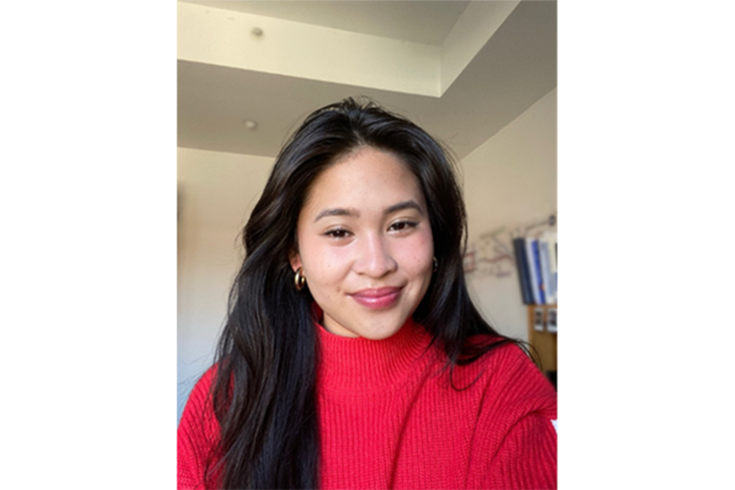
What was your research project topic? What research questions did you explore?
My research topic was on the relationship between public interest groups and the United States Supreme Court. I focused primarily on two key moments in history: Roe v Wade and the nomination of Sandra Day O’Connor. I sought to understand how different groups such as the American Civil Liberties Union (ACLU) and Americans United for Life (AUL) understood the Court and their relationship to it. I explored the changes and continuities of the Court’s relationship to the people and how it became a magnet of discourse.
What sparked your interest in your chosen academic research area?
I’ve always had a passion for history. My interest in the courts heightened during the 2016 presidential election. Amidst the rampant misogyny and sexism, I feared the future changes to the courts and what it would mean for women like me. I used my fear and anxiety to solidify my plan to become a lawyer and advocate for women’s rights.
How did you find out about opportunities for undergraduates to do research and creative scholarship, and how did you get started?
I did a lot of googling and used keywords such as “law,” “legal,” “research,” and “undergraduate.” I also expanded my LinkedIn network to gain a broader view of research opportunities promoted by my peers.
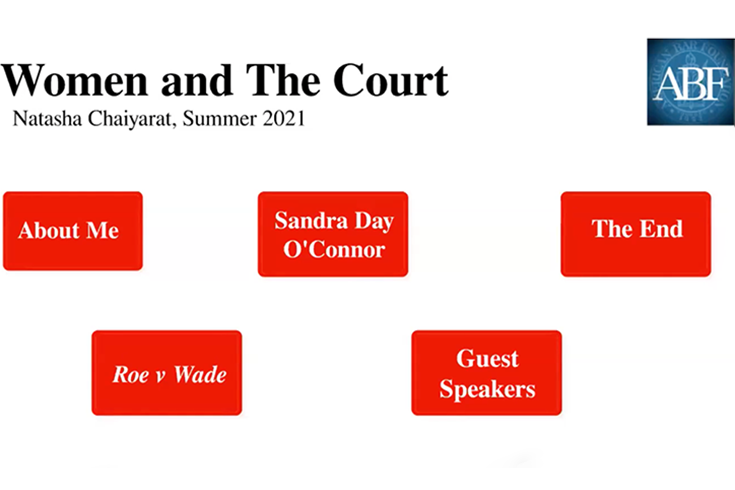 What type of funding have you received for your project, including grants, fellowships, and paid research assistant positions?
What type of funding have you received for your project, including grants, fellowships, and paid research assistant positions?
I received a stipend for the paid research position, the American Bar Foundation Summer Undergraduate Research Fellowship.
Did your experience have unexpected benefits to you?
It helped improve my self-confidence. My role as a research assistant was influential because the sources I chose would help to create a narrative about the people and the Court. In other words, I was responsible for ensuring that the voices that are often gone unheard in history were included. My experience as a research assistant at the American Bar Foundation reinforced the notion that I have valuable insights that will shape the way history is told.
What were some challenges or obstacles you faced during this process and how did you overcome them?
The most challenging part of the process was synthesizing all the information I gathered. I overcame this challenge by adhering to the recommendations that my mentor suggested and kept in mind that brevity was my best friend.
From whom did you receive guidance or inspiration?
My mentor, (Christopher Schmidt, Professor of Law; Associate Dean for Faculty Development; Co-Director of the Institute on the U.S Supreme Court, Chicago-Kent College of Law) was my main source of guidance and I appreciated how he made space to check in with me and how I was doing in the program aside from the research he asked of me.
CLARC – Ancient History and New Technologies Come Together in CLARC’s New Research Agenda

In the Classical Artifact Research Collection (CLARC), Brandeis undergraduates are given opportunities to work with both ancient artifacts and cutting-edge technologies.
Through an internship program within the CLARC, students are encouraged to create their own research projects, working hands-on with artifacts. The CLARC includes more than 800 artifacts: ceramics, glass, statuary, jewelry, and coins from the ancient Mediterranean. The artifacts date from the Bronze Age to the Byzantine period and provide the Brandeis community with a unique lens through which to study ancient history. Joshua Aldwinckle-Povey (CLARC intern ’20-21) notes that, "Before becoming a CLARC intern, I had only ever studied history through texts and through others’ interpretations. Working directly with material culture has given me a new way to tell the stories of human history and there are many to be found in CLARC's collection!"

Draken Garfinkel (’23) curates his exhibit in the Goldfarb library entitled “Artifacts of Luristan.”
While CLARC boasts an impressive permanent collection, recent acquisitions provide interns with further opportunities to interact with material culture hands-on. This summer, Dr. Alexandra Ratzlaff (Classical Studies), the director of CLARC, established an agreement with the Joint Expedition to Caesarea Maritima Project and Drew University to bring an assemblage of Roman ceramics to Brandeis. This material, which consists of more than 5,000 ceramic fragments will allow Brandeis students to gain unique insight into the process of archaeological study as they work alongside Dr. Ratzlaff to document, interpret and eventually publish the ceramics. This new collection of pottery is the basis of a course being offered for the first time in Fall ’21, “Pots, Processes and Meanings: A Practicum in Archaeological Ceramics.” In this course, both graduate and undergraduate students work to analyze, document and curate the pottery.

Joey Kornman gives a thumbs up to his newly completed library exhibit on Roman Coins.
Each year, the CLARC undergraduate interns develop thematic projects on targeted groups of artifacts. The final product of their research and analysis is the curation of a museum exhibit displayed in the Brandeis library. In the Spring ’20 semester, four new displays were installed in the library. The exhibitions are entitled “Roman Coins”, “The Utility of Ancient Artifacts Represented Through the Physical Senses”, “Linear A and Cyrus Gordon” (in cooperation with the Brandeis Archives), and “Artifacts of Luristan.” Draken Garfinkel (CLARC Intern ‘20-22) conducted research on a group of metal and ceramic artifacts from the ancient region of Luristan (modern Iran). Of his experience working in CLARC, Draken says, “As researchers we combine data from disparate sectors and synthesize it into meaningful conclusions: One time to identify a certain axe-head I checked out books on ancient artifacts from Goldfarb, reviewed the collections of museums online, and read excavation reports from nearly 80 years ago...in one day. It amazes me how much of the data we seek is already out there, just waiting to be connected properly.”

Students create 3D replicas in miniature of Hellenistic mold-made bowls.
Graduate students are also encouraged to work in CLARC. Nicole Constantine (MA ’22) is the Graduate Supervisor of the collections, and her role includes overseeing interns’ research projects. “For graduate students,” Nicole says, “CLARC provides a unique opportunity for pedagogical growth, as we learn how best to support students' interests and help them to create meaningful research projects within the collection. During weekly check-in meetings with the interns, we hear about the progress of everyone’s research and share ideas for how to expand our research goals.”
Along with more traditional methods for studying artifacts, students in CLARC are also trained to use a variety of technologies to photograph and 3D model the artifacts they study. According to Constantine, “In CLARC, we explore best practices for the 3D documentation of artifacts, including photogrammetry, structured light and laser scanning. We have the flexibility to design different methodologies and experiment with a wide variety of tools.” The 3D artifact models created by students will be featured in a Virtual Reality CLARC Museum, which will launch this winter. The VR Museum will allow anyone to tour the collections and interact with the artifacts, creating a accessible, immersive experience. Jalon Kimes (CLARC Intern ’20-22) is designing dynamic VR scenes in which the artifacts will be displayed, “I would describe my learning experience as a CLARC intern has been a very exploratory one. As the VR specialist, once we decided on a goal for each part of the project, I have the freedom to explore and learn about many different methods for achieving the final product. My 3D modeling and texturing skills have continually improved throughout this internship. I have also learned more about the architecture and materials used to create these environments.”
Alongside her role as director of CLARC, Dr. Ratzlaff also serves as the Project Lead for the Brandeis Techne Group, an interdisciplinary team of scholars and researchers working to study the digital imaging and 3D modelling of archaeological materials.

A Roman glass vessel is given a new housing as part of the CLARC interns artifact conservation project.
The Techne Group includes members of the Research Technology and Innovation Department - Ian Roy, Tim Hebert and Hazal Uzunkaya - as well as Brandeis graduate student Nicole Constantine and Jalon Kimes, an undergraduate student and CLARC intern. Since 2019, the Techne Group has held a residency at Boston Autodesk Technology Center. Since COVID-19 prevented the Techne Group from accessing the excellent resources available to them at Autodesk, Dr. Ratzlaff organized the loan of a Faro Laser Scanning Arm to CLARC in Fall ’20. With this technology, the Techne team was able to 3D model a variety of CLARC artifacts that are difficult to model using other methods. The 3D models produced with the Scanning Arm will be displayed in the virtual reality museum, and the project allowed the Techne Group to further explore best practices for 3D modelling a variety of ancient materials.

Jalon Kimes (’23) showcases a Roman warehouse where artifacts found in CLARC may have originally been stored. As part of the virtual reality CLARC in development, this is one of several ‘environments’ created by Kimes for participants to experience while learning about artifacts and the ancient world.
CLARC is looking forward to a year of interesting and engaging projects with a new cohort of interns. Dimbiniaina Raveloson (CLARC Intern ‘21-22) shares his excitement about the upcoming year, “I thought working in CLARC would be the best of both worlds. The classics courses I have taken in the past year has encouraged me to put my learnings to practice and work hands-on with the information I learned. I am interested in learning about the technologies currently used to date and analyze artifacts. I am also interested in working hands-on with material culture to identify patterns and themes to understand these artifacts and the people who used them.” Sasha Astrof (CLARC Intern ‘21-22) shares this excitement - “I think working with artifacts first-hand is amazing -- it feels like I'm going to touch history, and by working with the physical artifacts, I am also getting to leave my mark.”
Erin Magill and Ruth Rosenblum
URCC Undergraduate Assistant Natasha Chaiyarat ‘22 interviewed two undergraduate students (Erin Magill and Ruth Rosenblum) on their research at Brandeis for the May 2021 issue of the URCC Newsletter. The interviews are provided below.
Erin Magill
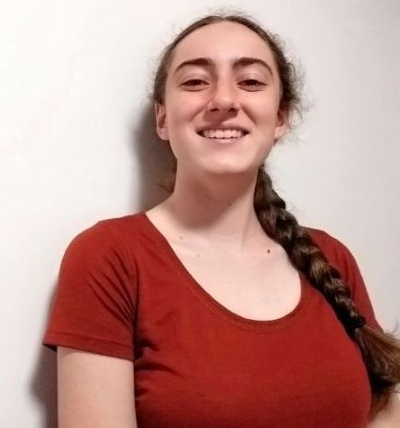 Chaiyarat: My name is Natasha and I'm a junior. I work with the Undergraduate Research and Creative Collaborations Office and this interview is to just get an understanding of your undergraduate research experience. What is your subject of research and what made you interested in research in the first place?
Chaiyarat: My name is Natasha and I'm a junior. I work with the Undergraduate Research and Creative Collaborations Office and this interview is to just get an understanding of your undergraduate research experience. What is your subject of research and what made you interested in research in the first place?
Magill: We [the research group] started with helping build a linguistic corpus, which is the DID recordings of children who speak Russian- growing up in Russian speaking households, but in the United States, Germany and in Russia- and then transcribing all of that speech, and then annotating it for linguistic information. So, anybody can then- once it's published- use this corpus to do research on Russian and language acquisition, bilingual language acquisition. The way I started with it was this summer by working as an annotator doing segmentation on the data where I was listening to the recordings and reading the transcripts and essentially breaking it up into sentences so that people can search the corpus when it's published and get the data in the right units. The segments that I was making are what you will end up searching for and getting a relevant amount of language.
Chaiyarat: How did you get interested in this topic?...Are you a major in Linguistics?
Magill: Yeah I love Linguistics and French and Francophone studies, but I've also taken Russian. I'm hoping to minor in that and so I ended up working for the project because I was asked by Professor Malamud, who's a Linguistics professor and Professor Dubinina, a Russian professor… I had both of them in class and they were looking for people who had a background in Linguistics and also spoke Russian.
The amount of Russian I spoke when I started working on the project was small. I had taken a year Russian classes, so I was quite a bit intimidated by the idea of working in a Russian-speaking environment, but I'm sure I was slower than other people doing segmentation; I was managing to at least understand.
Chaiyarat: That's awesome. If you could just talk a little bit more about your relationship with your mentors? You said that when you were dealing with the Russian it was kind of nerve wracking a little bit, so how did you maneuver your experience and how did your mentors help you?
Magill: First, I think they both were more confident about my ability to do the work in Russian then I was myself. So, I got the instructions about what I was supposed to do, and I was like, it was so far over my head in my opinion. I was overwhelmed and I was also thinking, if Professor Dubinina and Professor Malamud think I can do this, I must be able to.
Chaiyarat: I would like to talk more about- you mentioned that it's a group thing. Like you have two mentors, you have another person working, so how is that? What is the dynamic like working on a group research effort?
Magill: When we were building the corpus we're all doing the same annotation job. So, we would have a meeting once a week to meet and go through what questions we had, talked about it with Professor Malamud, and now we still have weekly meetings. But the three of us each have our own separate topic that we're learning about. I'm learning about the way that children make requests in different languages, and how requests are made in different languages, and then how children start learning to make requests- especially in Russian. I've been looking at the Russian equivalent of the word, “please”. And then Ruth [Rosenblum] is looking at passes, which I’m sure she'll talk more about, and Keren is looking at gender and case acquisition. So, the three of us are all doing really different areas of linguistics that have to do with Russian language acquisition.
Then once a week we get together and take turns presenting what we've learned about and then discussing it. So, we're all involved in each other's research projects in the way that- we're seeing the presentations and are there for the discussions, so we have some idea of what everybody else is working on.
Chaiyarat: Could you reflect on the research, like the process so far, what would you say has been the greatest advantage and the biggest challenge that you've experienced while working on this?
Magill: The biggest challenge is definitely not being fluent in Russian. So, one of the big things I've learned is how to operate in our Russian-speaking environment. Also, I have learned from the research part of it how to critically read studies that other people have done and think about, not just what can this teach me but also what other questions it raises that haven't been answered: How can it be improved upon? How can we use the data we now have to get a better answer to a question?
Chaiyarat: You've definitely developed more avenues of problem solving different perspectives and techniques. Did you receive any type of funding or grants for your project?
Magill: Yeah, I'm in the research experience for undergraduates, I know the corpus building project, and the two professors, got a grant to get undergraduates involved.
Chaiyarat: Is there anything else you want to say about your experience, if you have any advice for students?
Magill: I didn't realize I was doing this when I started college, but I took a lot of classes in my linguistics major in freshman and sophomore year and that I realized later that it allowed me to do things like research as an upperclassman. I already quickly got that background, instead of waiting until I was an upperclassman to take classes, that you would need to do research for.
Ruth Rosenblum
Chaiyarat: My name is Natasha and I'm a junior. I work with the Undergraduate Research and Creative Collaborations Office and this interview is to just get an understanding of your undergraduate research experience. Could you give me information about what your academic project is and the research or creative questions that you're exploring?
Rosenblum: The project is a linguistics project and it has sort of two parts. So first we're just building a corpus of speech…The goal is to build a one-million word corpus and annotate with different linguistic information. We were doing morphological imitation and syntactic annotation, things like that. And then, once that corpus is built, it can basically be used to do different sorts of research on the Internet. Like anyone interested in Russian child speech or like Russian acquisition or things like that or comparing modeling will to bilingual acquisition could use it to do that research on it. Now that the corpus- parts of it-are built in, parts of it are very close to being finished, we're starting to do our own research on it. My group has undergrads that are working on this project, each person is doing their own research. Specifically, I’m doing research about the acquisition of passive constructions in Russian. And the goal is to compare how multilingual kids that grow up only speaking Russian acquire assets to help them speak Russian and German, and in English, like kids that grow up in English-speaking, German-speaking countries.
Chaiyarat: What sparked your interest in linguistics research?
Rosenblum: I took a couple of classes in Linguistics and thought it was really cool. I didn't think I was going to do Linguistics before college. I thought I was going to do Math and Computer Science and then I took a Linguistics class, and it was really interesting. I started exploring Linguistics and General Intro core classes. Also, just because the project requires knowledge of Russian- or at least the part I'm doing requires knowledge of Russian- when I took a Russian class at Brandeis the professor, who is also working on the projects, asked me if I would like to participate and that seemed really interesting.
Chaiyarat: This wasn't something that you actively pursued? It was an opportunity that came to you?
Rosenblum: Yeah, I knew both professors; one is the Linguistics professor and one is the Russian professor and can you believe it, I have some experience in Linguistics and some experience in Russian, and that's why they asked.
Chaiyarat: How did you find out about opportunities for undergraduates to do research? I know you mentioned they scouted you, but how did you get started with the whole research process?
Rosenblum: I think in the very beginning, I was just doing annotation and so I didn't even know that I was going to work on it for a long time. It was just kind of like; we need people to do annotations that know Russian basically. Then I think, so the grant for specifically undergraduate research, which is when we started doing our own research on projects and that was this year. I think that's pretty much it…
Chaiyarat: That makes total sense. Were you always interested in research, apart from linguistics? Was that something that kind of interested you?
Rosenblum: Yeah, I started working on this and the middle of freshman year, I think. So, I think I was definitely interested in it, but wasn't thinking specifically about opportunities yet. Definitely when they told me about it, I thought it was really cool, in part because they wanted to do research that's cool.
Chaiyarat: [How is] your relationship with your mentor and how are the dynamic is between you guys.
Rosenblum: I really liked my mentor. I really enjoy working on the projects with her; I took two classes, I think three. I'm taking one class with her now so three in total. I think part of the reason that I agreed to the project and I'm enjoying the project is because I really liked her as a professor, and I'd known her before that. That helped…The dynamic, I think, is pretty casual, like a lot of the meetings we have. All the people that are working on the project and some of them are not Brandeis students…so it's a very diverse group of people, I guess, because English-speaking people and Russian-speaking people and people in the Ukraine and students in the US and all these people working together and, yeah, I think it makes the dynamic a lot less formal, I feel like, then if it was just a professor and student.
Chaiyarat: What were some challenges or obstacles that you face during the process and, if you could talk about how you overcame them, that'd be really cool.
Rosenblum: Yeah, I think one thing that could be difficult for not even just me specifically, but the group in general, would be communication and organization. Because as I said, a lot of people are in different countries and speak different languages. Just the fact that we need to meet with 15 people every week can be hard because it could be hard to find a time for everyone to meet…I guess another thing is, people are just willing to meet at difficult times, too. For example, people in California meet at six in the morning and other people meet at midnight and make accommodations for the time…
Chaiyarat: Can you talk about who you got guidance or inspiration from?
Rosenblum: Yeah, the professors- both the professors that lead that were guiding and helping me know what to do and where the project is going and what they might be doing in the future. But yeah that was helpful.
Chaiyarat: I was just wondering if you received any type of funding for this project? That can include grants or fellowships or paid research assistant positions, anything.
Rosenblum: This was a paid research assistant position. So, I specifically didn't get a grant but the professor got a grant that she used for undergraduate research…it was an NSF grant I think…Then they got a grant or supplements to the grants that were specifically for undergraduate research and so that was used.
Chaiyarat: As we start to close, I was just wondering if you maybe had any advice for other undergraduates who don't know if research is something that they want to pursue, or what advice would you have for them?
Rosenblum: I guess talk to professors that you like, and chances are they're doing research that is interesting and especially if it's in the subject that you're studying in your major…They're definitely always really happy to talk about what they do so, it could just be like: hey, are there any positions in your lab and what would that involve? I think that that has worked for a few people in different departments, I think that would be something to do.
Chaiyarat: [Is there] anything else that you kind of want to highlight that I didn't mention from your experience?
Rosenblum: There's a lot of directions to go in, even if you're working on just one project, which was something that was interesting and surprising to me because I thought- when I started working on this project- I thought I would basically be doing the same thing I'm doing until I'm done working on it, which hasn't been the case at all. I switched three times between doing pretty different things, from just annotation to coding computer programs to actual research and reading literature about it. It depends on the project, but often there are very different parts of the project that you could be working on depending on what experience you have. That was really cool and something I really liked about the experience.
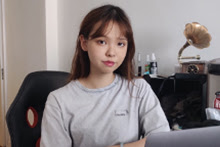 Major: Psychology & Education
Major: Psychology & Education
Minor: East Asian Studies
Project Title: The Mediating Effect of Dependent Stress Frequency and Perceived Controllability on the Relationship Between EF and Internalizing Psychopathology
Faculty Mentor: Hannah Snyder, Assistant Professor of Psychology
Funding: Louis D. Brandeis Legacy Fund for Social Justice Fellowship
About the project: The COVID-19 pandemic has added many new stressors to a college student’s daily life. Chelsea notes that “previous research has found that dependent (self-generated) stress and the perceived controllability of stress play potent roles in the development of internalizing psychopathology” such as anxiety, health anxiety, or depression. Her research project, in collaboration with other researchers, examines potential associations between Executive Function (EF) performance and depression, general anxiety, and health anxiety in a population of more than 150 Brandeis undergraduates, who were recruited through Brandeis-related pages on social media platforms. Chelsea will continue with data collection and analysis during this academic year.
Personal reflection: This summer, Chelsea gained experience conducting a literature review and working as part of a collaborative research team. She advises new undergraduate researchers that “always staying positive” helped her address challenges.
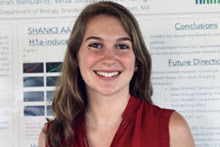 Major: Neuroscience
Major: Neuroscience
Minor: French
Project Title: Sleep disruption in SHANK3 knockout mice
Faculty Mentor: Gina Turrigiano, Joseph Levitan Professor of Vision Science
Funding: Provost’s Undergraduate Research Summer Research Award
About the project: Hannah responded to travel restrictions imposed in response to the COVID-19 pandemic with resilience and positivity. She had arranged a collaboration with a research group at Humboldt University in Germany to image live neurons using cutting-edge techniques. When it became apparent that travel would not be possible, she consulted with her faculty mentor, Professor Turrigiano, and shifted to a new remote research project. For this project, Hannah used a behavioral tracking program and computational approach to investigate the role of a specific neuronal protein in the sleep-wake cycle of mice, a model organism used to study human diseases. Mutations in this protein in humans are associated with Autism Spectrum Disorders, which are typified by abnormal sleep. Hannah will continue her research this academic year.
Personal reflection: Hannah “would advise anyone working on independent research to recognize that setbacks and troubleshooting are a core part of research” and that “knowing when to ask for help is extremely important.” She appreciates the mentoring she received from her faculty and graduate student research mentors.
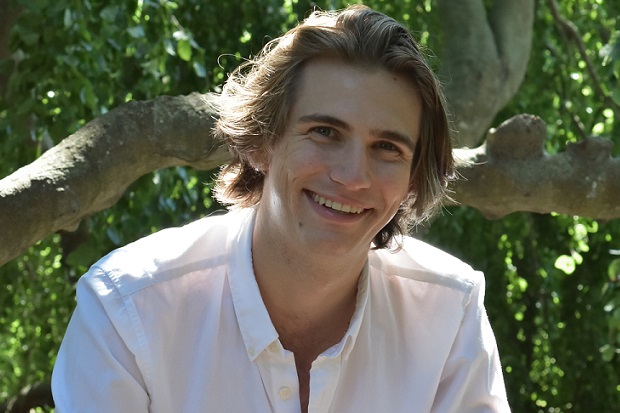 Read in BrandeisNOW about Jason Frank, ’22, and his inquiries on “why there are no famous gay comedians.”
Read in BrandeisNOW about Jason Frank, ’22, and his inquiries on “why there are no famous gay comedians.”
Recent Faculty-Student Partnerships
Derron Wallace has been involved in a very exciting research project with the Boston Public Schools that included a number of undergraduate and graduate research assistants. I quote him in his discussion of the project and its outcomes: “With a team of eight students, (including 3 graduate students and 5 undergraduates--most of whom were first-generation college students), we analyzed survey responses from 17,000 BPS families. We coded and analyzed all the survey responses, produced a policy report and made a formal presentation of our findings to BPS, which the Superintendent and her senior cabinet (including the Assistant Superintendent for Equity) reviewed and incorporated in their final plans. By all the reports, the project assisted BPS in sharpening its focus on racial equity as part of the planning process for school reopening efforts. We are delighted that this project was impactful for BPS. I am also pleased that the research proved meaningful for our students...the doctoral, master's and undergraduate students on the project appreciated this research opportunity a great deal. The project was also beneficial for other students at Brandeis, as the research team made presentations about schooling during the COVID-19 pandemic in my Sociology of Education and Critical Perspectives in Urban Education courses this semester. This helped more students to learn about Boston Public Schools, the challenges school districts across the country are contending with, and the relationship between educational policies and public health policies.”
Ziva Hassenfeld’s new Jewish Education Research Lab, housed at the Mandel Center for Studies in Jewish Education, is currently employing four undergraduates and plans to hire two to three more next semester with awarded Norman Funds. These students are conducting qualitative social scientific research related to a number of Professor Hassenfeld’s ongoing projects, including “Children and Text Study During Emergency Remote Learning” and “Children Reading Biblical Joseph.
Program affiliate Jonathan Krasner has involved four undergraduate students and one graduate student from the Hornstein Program in his historical research projects on Jewish Day School history and research connected to his recent publication Hebrew Infusion.
Joseph Reimer also employed an undergraduate research assistant in his research on Jewish summer camps.
Leah Gordon employed one Brandeis undergraduate student last summer to conduct historical research for her book project Imagining Opportunity: Education and Equality in Modern America and will use Norman funds to employ two more in the coming year.
Jytte Klausen launched the Western Jihadism Project (WJP) to support research on terror networks. Over the past 20 years, she has engaged over 80 student researchers. Yujiao “Sue” Su ’19, led peer researchers and contributed findings to WJP from her senior research thesis. Yujiao considers herself fortunate to have had Professor Klausen as a mentor who taught her the value of research. Building on their experience, WJP research alums have gone on to prestigious positions such as intelligence analyst with the New York Police Department and member of the UN Steering Committee for the Global Anti-Human Trafficking Task Force.
Sophia Malamud Associate Professor of Linguistics, Irina Dubinia Associate Professor of Russian and Director of the Russian Language Program, Benjamin Rozonoyer ‘20, Ruth Rosenblum ‘22, and also Maria Shaposhnikova ‘18 and Yan Shneyderman ‘18 are building an annotated corpus of audio recordings of Russian-speaking children and their parents (the BiRCh project). The dataset includes audio of families from Russia and Ukraine, as well as the US, Canada, and Germany (where the language the children speak at home differs from the one they will speak at school). From the recordings they create transcripts, which are then separated into segments and annotated for morphological and syntactic features. The goal is to build a full, publicly accessible corpus of audio-aligned transcripts of spoken Russian with detailed linguistic annotation, that could then be used to conduct linguistic studies about the acquisition of language by children who grow up bilingual (speaking Russian at home and a different language at school). While undergraduates at Brandeis, Masha and Yan became co-authors on a study of discourse markers using the BiRCh data. Benjamin wrote a program to perform the first steps of syntactic analysis as part of a class project, and is currently an active researcher in the syntactic analysis team. Ruth is also involved with the morphological annotation team and hopes to work on syntactic analysis as well in the future.
Elenah Uretsky, Assistant Professor of International and Global Studies, is collaborating with undergraduates on the African Migrant Research Project focusing on African migrants and their lives in Guangzhou, China:
The students were tasked to go through the transcribed interviews that were conducted with the migrants in Guangzhou. They analyzed each transcription to find/ “code” based on recurring themes, such as the importance of religion, access to healthcare, and community support, in order to then condense their analysis with quotes.
“I've been able to really explore more aspects of the major and choose electives that interest me. Something that I have really begun to enjoy is when I am making connections between classes and when they click with regards to real-world situations. The ability to apply information that I am learning in classes (such as migration theory from my class POL 134 about the GLobal Migration Crisis) and applying it and making connections to real-world examples of African migrants in China.”
-Kate Ross ‘21, International and Global Studies major with triple minors in East Asian Studies, Economics, and Health: Science Society and Policy.
“This project is incredibly rewarding in many ways! It is interesting to learn about the lives of these migrants and how they are adapting to life away from home. It is interesting to read their views on how they fit into society, what their future goals are, and various other aspects of their lives. I also enjoy the data analysis because I think it is more engaging than quantitative analysis in the sense that every new interview is a whole different story, but it is still challenging because I have to pay attention to very minute details (such as the tone of one's interview) that may not be very obvious. I've really enjoyed watching my analytical skills grow, and I am incredibly excited to see where my peers and I can take this project with Professor Uretsky's guidance.
I definitely feel like the greatest challenges in obtaining research projects is gathering the courage to email a professor about their work, and asking for positions. There is a huge mentality that professors are always busy and that email response rates are low. My suggestion is to email professors asking to come into their open office hours and have an in-person conversation with them! ”
-Nabeeha Haq ‘22, HSSP and Biology major, on the pre-med track.